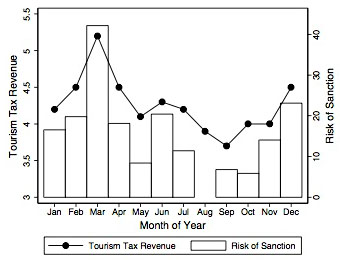 Mike Konczal says the illustration on the right is his favorite graph of the week. It’s based on data from the Welfare Transition program in Florida and it shows two things. The line shows tourism revenue: high in winter, lower in spring, and lower still in summer. Obviously the tourism industry in Florida needs more workers in winter than in summer.
Mike Konczal says the illustration on the right is his favorite graph of the week. It’s based on data from the Welfare Transition program in Florida and it shows two things. The line shows tourism revenue: high in winter, lower in spring, and lower still in summer. Obviously the tourism industry in Florida needs more workers in winter than in summer.
The bars show the sanction rate in the WT program: higher in winter and lower in summer. Apparently, when the tourism industry needs more workers, welfare case workers are more likely to force their clients out of the system and into the job market (i.e., “sanction” them).
The authors say that the correlation between these two things is .95, which is, frankly, too good. If Florida’s welfare bureaucracy was trying to match up workers with the needs of the tourism industry, they couldn’t produce a correlation that perfect. So there has to be something more going on here.
Still, this is nonetheless pretty persuasive evidence that case workers do, in fact, calibrate sanction levels to the needs of the job market. So my next question is this: is this a bad thing? Mike doesn’t really take a position, though he seems vaguely disapproving. And it’s possible that the details of the sanctioning regime are objectionable. But just in general, is there anything wrong with welfare case workers trying to push clients into the job market when jobs are available, but being more lenient when jobs just aren’t there? Offhand, I’m not sure I see a problem with this.

















